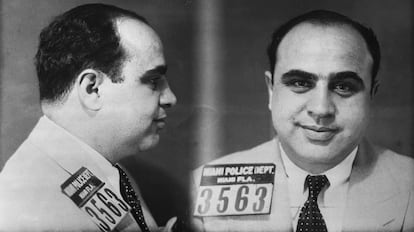What can Trump learn from Al Capone and Richard Nixon?
What typically brings down people in power is the cover up, not the crime

“I could stand in the middle of 5th Avenue and shoot somebody and wouldn’t lose any voters,” said the current president of the United States when he was still a candidate. He was probably right then and even today he can still count on a large number of loyal supporters. However, this does not mean that Donald Trump is invulnerable. His stay in the White House could easily be truncated by a massive political revolt or by a judicial process that leads to his removal.
The latter is more likely than the former. It is surprising how often in the United States that governors, mayors, members of Congress and the executive branch, as well as other senior officials, lose their office for breaking the law. Not even presidents are immune to catastrophic legal blunders.
Not even presidents are immune to catastrophic legal blunders
These entanglements often occur when a politician or government official tries to cover up a “minor” offense or misconduct that could damage his reputation. For this he lies under oath or obstructs justice, thus committing a more serious crime than the one he’s trying to hide. “What brings you down is not the crime, it’s the cover-up,” is a phrase that is regularly heard in the circles of power in the United States (and ignored with equal regularity).
This happened to Richard Nixon, who resigned just before being impeached for obstructing justice when he tried to hide his involvement in the Watergate case. And it also happened to Bill Clinton, who was accused of lying under oath in his deposition about his relationship with Monica Lewinski. The House of Representatives voted in favor of his dismissal as president, but the Senate acquitted him, allowing him to finish his term. And this just happened to the Alabama governor, Robert Bentley, who has had to resign after being accused of lying and using public funds to hide an extramarital affair he had with his political adviser. Again, the efforts to hide his conduct, and not the conduct itself, were the cause of his departure from office. And it has also happened to General Michael Flynn, the national security adviser appointed by President Trump. Flynn set a record by serving only 20 days in office. He had to resign when it was discovered that – despite his initial denial – the talks he had with the Russian ambassador to the US did include the possibility of easing the economic sanctions against Russia for invading Crimea. His talks with the diplomat were not the cause of Flynn’s departure, but rather the lie about their content.
The cases of Governor Bentley and General Flynn are just examples from this week and last month, but the list of the powerful who stop being so when trying to cover up scandalous sexual relations, influence peddling, acts of corruption, misuse of public funds or their role in bad decisions is incredibly long. Donald Trump would do well to learn the lesson.
“Following the money” was the slogan that finally put Al Capone in jail
The other lesson that he should keep in mind is that money leaves fingerprints. That is why “follow the money trail” has become another popular slogan in Washington. Tracing the origins and intermediaries, the kickbacks and all the movements of funds is the best way to find the vulnerabilities of the powerful. In the United States, sex scandals and misappropriation of funds are the two most frequent reasons why political leaders fall. “Following the money” was the slogan that finally put Al Capone in jail, for example. The most famous gangster of the 20th century was accused of all sorts of crimes, including 33 murders, but no one could ever prove it. Only when the authorities succeeded in proving that he had evaded tax payments, was Capone sentenced to a long prison term.
Last week, the Associated Press revealed that Paul Manafort, the head of Donald Trump’s campaign between March and August of last year, received $1.2 million from a pro-Russian political group based in Ukraine. Manafort, who initially said the report was false, now admits the he received the money, but claims that it was payment for services rendered. We know that the FBI is investigating Manafort for possible contacts with Russian agents who may have been supporting the presidential campaign. It is also known that Donald Trump has refused to make his taxes public. It is difficult for these documents not to come to light. When that happens, “following the money” may offer some very interesting revelations.
Trump would do well to keep in mind how Al Capone and Richard Nixon went down.
Follow me on twitter @moisesnaim
Tu suscripción se está usando en otro dispositivo
¿Quieres añadir otro usuario a tu suscripción?
Si continúas leyendo en este dispositivo, no se podrá leer en el otro.
FlechaTu suscripción se está usando en otro dispositivo y solo puedes acceder a EL PAÍS desde un dispositivo a la vez.
Si quieres compartir tu cuenta, cambia tu suscripción a la modalidad Premium, así podrás añadir otro usuario. Cada uno accederá con su propia cuenta de email, lo que os permitirá personalizar vuestra experiencia en EL PAÍS.
¿Tienes una suscripción de empresa? Accede aquí para contratar más cuentas.
En el caso de no saber quién está usando tu cuenta, te recomendamos cambiar tu contraseña aquí.
Si decides continuar compartiendo tu cuenta, este mensaje se mostrará en tu dispositivo y en el de la otra persona que está usando tu cuenta de forma indefinida, afectando a tu experiencia de lectura. Puedes consultar aquí los términos y condiciones de la suscripción digital.









































